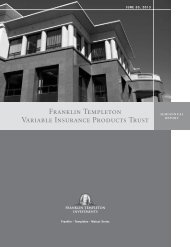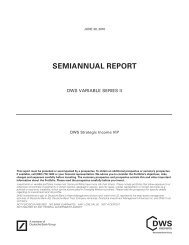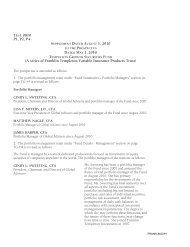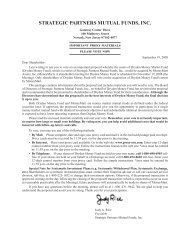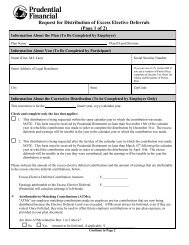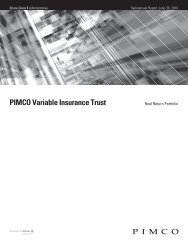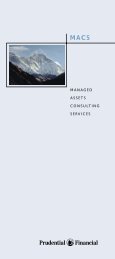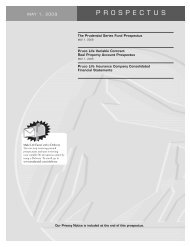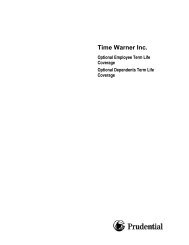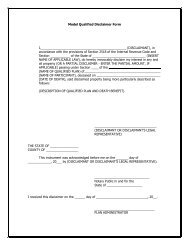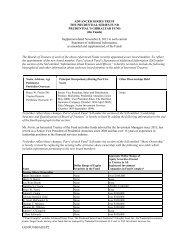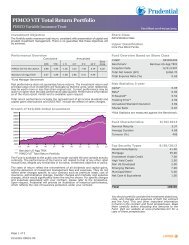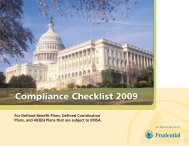The Prudential Series Fund
The Prudential Series Fund
The Prudential Series Fund
You also want an ePaper? Increase the reach of your titles
YUMPU automatically turns print PDFs into web optimized ePapers that Google loves.
Foreign investment risk. Investing in foreign securities generally involves more risk than investing in securities of U.S. issuers. Foreign<br />
investment risk includes the specific risks described below:<br />
Currency risk. Changes in currency exchange rates may affect the value of foreign securities held by a Portfolio and the amount of<br />
income available for distribution. Currency exchange rates can be volatile and affected by, among other factors, the general<br />
economic conditions of a country, the actions of the U.S. and non-U.S. governments or central banks, the imposition of currency<br />
controls, and speculation. A security may be denominated in a currency that is different from the currency of the country where the<br />
issuer is domiciled. Changes in currency exchange rates may affect the value of foreign securities held by a Portfolio and the amount<br />
of income available for distribution. If a foreign currency grows weaker relative to the U.S. dollar, the value of securities denominated<br />
in that foreign currency generally decreases in terms of U.S. dollars. If a Portfolio does not correctly anticipate changes in exchange<br />
rates, its share price could decline as a result. In addition to the policies described elsewhere in this Prospectus, each Portfolio may<br />
from time to time attempt to hedge a portion of their currency risk using a variety of techniques, including currency futures, forwards,<br />
and options. However, these instruments may not always work as intended, and in certain cases the Portfolio may be worse off than if<br />
it had not used a hedging instrument. For most emerging market currencies, suitable hedging instruments are not available. See<br />
“Hedging Risk” below for more information.<br />
Emerging market risk. To the extent that a Portfolio invests in emerging markets to enhance overall returns, it may face higher<br />
political, information, and stock market risks. In addition, profound social changes and business practices that depart from norms in<br />
developed countries’ economies have sometimes hindered the orderly growth of emerging economies and their stock markets in the<br />
past. High levels of debt may make emerging economies heavily reliant on foreign capital and vulnerable to capital flight.<br />
Foreign market risk. Foreign markets, especially those in developing countries, tend to be more volatile than U.S. markets and are<br />
generally not subject to regulatory requirements comparable to those in the U.S. Because of differences in accounting standards and<br />
custody and settlement practices, investing in foreign securities generally involves more risk than investing in securities of U.S.<br />
issuers.<br />
Information risk. Financial reporting standards for companies based in foreign markets usually differ from those in the United States.<br />
Since the “numbers” themselves sometimes mean different things, each Subadviser devotes research effort to understanding and<br />
assessing the impact of these differences upon a company’s financial conditions and prospects.<br />
Liquidity risk. Stocks that trade less can be more difficult or more costly to buy, or to sell, than more liquid or active stocks. This<br />
liquidity risk is a factor of the trading volume of a particular stock, as well as the size and liquidity of the entire local market. On the<br />
whole, foreign exchanges are smaller and less liquid than the U.S. market. This can make buying and selling certain shares more<br />
difficult and costly. Relatively small transactions in some instances can have a disproportionately large effect on the price and supply<br />
of shares. In certain situations, it may become virtually impossible to sell a stock in an orderly fashion at a price that approaches an<br />
estimate of its value.<br />
Political developments. Political developments may adversely affect the value of a Portfolio’s foreign securities.<br />
Political risk. Some foreign governments have limited the outflow of profits to investors abroad, extended diplomatic disputes to<br />
include trade and financial relations, and imposed high taxes on corporate profits.<br />
Regulatory risk. Some foreign governments regulate their exchanges less stringently, and the rights of shareholders may not be as<br />
firmly established.<br />
Taxation risk . Many foreign markets are not as open to foreign investors as U.S. markets. Each Portfolio may be required to pay<br />
special taxes on gains and distributions that are imposed on foreign investors. Payment of these foreign taxes may reduce the<br />
investment performance of a Portfolio.<br />
Growth stock risk. Investors often expect growth companies to increase their earnings at a certain rate. If these expectations are not<br />
met, investors can punish the stocks inordinately, even if earnings do increase. In addition, growth stocks typically lack the dividend<br />
yield that can cushion stock prices in market downturns.<br />
Hedging risk. <strong>The</strong> decision as to whether and to what extent a Portfolio will engage in hedging transactions to hedge against such<br />
risks as credit risk, currency risk, counterparty risk, and interest rate risk will depend on a number of factors, including prevailing<br />
market conditions, the composition of such portfolio and the availability of suitable transactions. Accordingly, no assurance can be<br />
given that a Portfolio will engage in hedging transactions at any given time or from time to time, even under volatile market<br />
environments, or that any such strategies, if used, will be successful. Hedging transactions involve costs and may result in losses.<br />
High-yield risk. Portfolios that invest in high yield securities and unrated securities of similar credit quality (commonly known as<br />
“junk bonds”) may be subject to greater levels of interest rate, credit and liquidity risk than Portfolios that do not invest in such<br />
14



